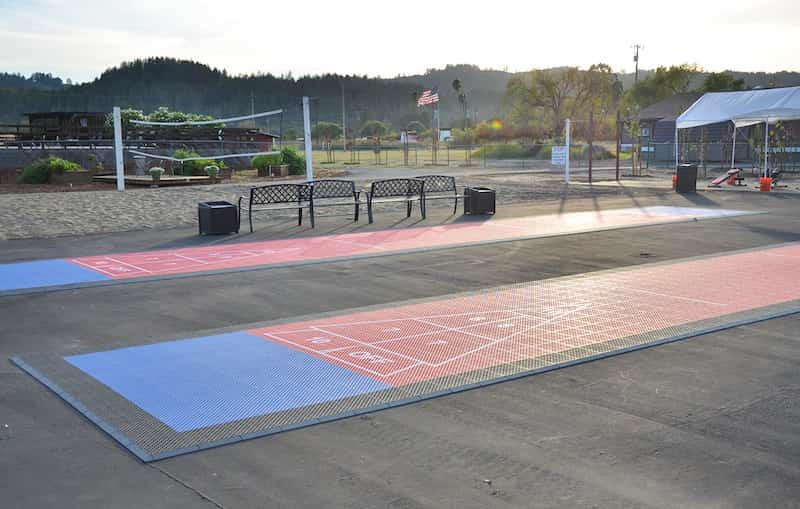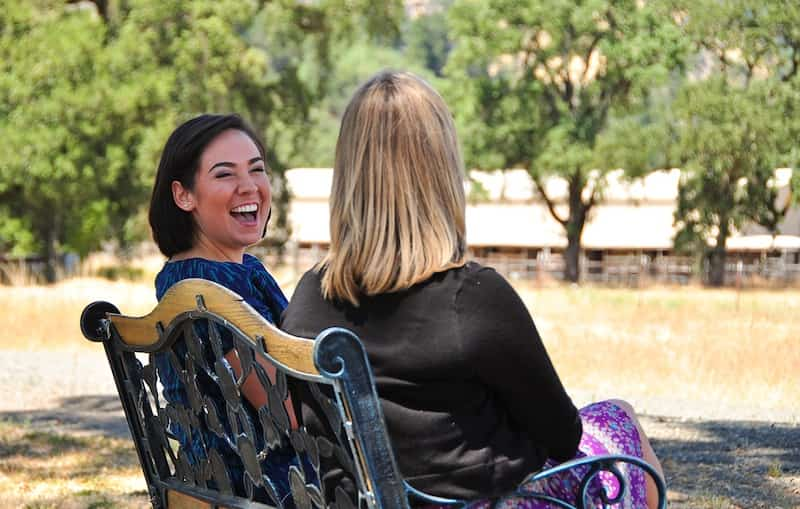With over 38,000 guests treated and a completion rate over 90%, Duffy’s Napa Valley Rehab outperforms other residential prescription painkiller addiction treatment centers by building the necessary foundation for long-term recovery through expert 12-Step treatment for painkiller addiction in Northern California.
Learn More About Prescription Painkiller Addiction Treatment
Learn More About Prescription Painkiller Addiction Treatment at Duffy’s Napa Valley Rehab in Northern California
While prescription painkillers provide much-needed relief from serve pain due to medical conditions or following surgical procedures, these types of medications can be extremely harmful if they are abused. When taken under the guidance and supervision of a qualified medical professional, OxyContin, Vicodin, and the like can be safe. However, should an individual misuse these substances for the purposes of acquiring a mind and mood-altering high, the effects that result can be far-reaching and devastating.
Classified as opioids, prescription painkillers are known to be highly addictive substances. In fact, a painkiller addiction to these medications can cause insurmountable destruction across every area of an individual’s life. Additionally, these medications can render serious health complications that could prove fatal if a chemical dependency concern of this kind persists. Fortunately, there is help and hope available. By electing to receive treatment to overcome a painkiller addiction, a brighter, a healthier future could become a reality.
Duffy’s Napa Valley Rehab, a renowned and long-standing provider of high quality addiction treatment, is uniquely prepared to offer the life-saving and life-changing care men and women need to defeat addictions to prescription painkillers. With a staff of professionals whose commitment to delivering clinically excellent care is surpassed only by their dedication to seeing guests thrive and succeed, this painkiller treatment center is where the dawn of a sober life can be realized. If you or someone you care about is in need of the transformative care that only Duffy’s can provide, contact us today.
How to Help a Loved One
Helping a Loved One get Treatment for Prescription Painkiller Addiction
Whether you have known for some time or just became aware of your loved one’s prescription painkiller addiction, you are no doubt experiencing a wide range of emotions and feelings. However, given your loved one’s condition, it is best to keep a calm head and take advantage of the uniquely powerful and positive impact you can have on your loved one’s life. Please consider the following:
- Learn all that you can about prescription painkillers. Be sure to learn about the signs of intoxication and overdose so that you can determine if your loved one is in need of emergency medical attention because of his or her addiction.
- Establish a plan of action, or a safety plan, for what needs to be done should your loved one require immediate care because of an overdose. It is also a good idea to enlist the help of other loved ones in this plan, too.
- Consult with addiction professionals or perform a search to learn about the latest and most effective treatment options for treating an addiction to prescription painkillers. Compile a list of treatment centers to present to your loved one when you have a conversation with him or her about the prospect of seeking treatment.
- Talk with your loved one about his or her painkiller abuse. It is a good idea to prepare yourself in advance for resistance or denial. However, try to remain nonjudgmental and compassionate during this conversation. Lastly, present your findings from your treatment center search to him or her at this time.
Once your loved one has agreed to attend treatment, offer to help him or her with any planning or preparations needed. It is also wise to convey your intentions of supporting him or her before, during, and after treatment.
Finally, it is important to make sure that you are practicing good self-care. You will only be able to offer the best support possible if you are taking care of yourself and continuing to take part in things that you enjoy and that rejuvenate you at the same time.
Why Consider Treatment
Why Consider Treatment for Prescription Painkiller Addiction at Duffy’s Napa Valley Rehab in Northern California
Seeking treatment for a prescription painkiller addiction is of the utmost importance in order to avoid potentially long-term, negative outcomes. The regular abuse of painkillers can prevent a person from performing to expectation at work, being able to maintain meaningful relationships with others, and living an otherwise healthy and satisfying life. Job loss, financial strain, divorce, and loss of child custody are all probable effects when the misuse of painkillers remains unchecked. Additionally, an individual is likely to experience numerous health concerns, including organ damage and overdose, if a chemical dependency concern of this kind persists. Fortunately, there are various options for treatment that, when received, can prevent these detriments from transpiring.
Types of Treatment
Types of Prescription Painkiller Addiction Treatment Offered at Duffy’s Napa Valley Rehab in Northern California
Situated on 23 acres of tranquil, picturesque land in Northern California, Duffy’s prescription painkiller rehab center is a pioneering provider of top notch addiction treatment for men and women aged 18 and older who wish to reclaim their lives from substance abuse and chemical dependency. With a mission to break through the ties that can bind a person to a substance or substances, we offer invaluable education, compassion, and the skills needed achieve and maintain sobriety. Duffy’s is truly where the destructive path of addiction can come to an end.
Grounded in the 12-Step principles of Alcoholics Anonymous, the treatment offered at this center makes for a transformative experience that can improve upon the lives of all who come for care. Trained, experienced, and dedicated staff members, many of whom have worked at our center for several years, go above and beyond to ensure that guests’ recovery journeys are both life-changing and meaningful. Upon completion of our streamlined admissions process, individualized treatment plans are created by these staff members so as to address and treat the concerns our guests come to us with. Within these plans, the following proven-effective and evidenced-based methods of care may be included as part of a man or woman’s experience at Duffy’s:
Medication management: If a guest is requiring medication in order to manage the symptoms of a mental health condition while working on recovering from an addiction to prescription painkillers, we, at Duffy’s, are pleased to be able to facilitate meetings with a psychiatrist on an as-needed basis. Our staff assists guests in providing them access to their medications, and the dosages administered are monitored closely so as to ensure the safety of all guests who require pharmaceutical interventions while in our care.
Individual therapy: Each man and woman who chooses to recover at Duffy’s is assigned a primary care counselor for the duration of his or her treatment. These staff members facilitate individual therapy sessions two times each week so that guests are able to process their feelings, emotions, and experiences in a private setting with a qualified professional. We believe that it is beneficial for those who are grappling with an painkiller abuse to take part in individual therapy, as this method of care allows them to openly discuss their experiences in a setting that is extremely conducive to both healing and recovering.
Group therapy: So as to provide guests with optimal support, Duffy’s painkiller rehabilitation program is proud to offer several group therapy opportunities to guests in Northern California who are battling abuse issues with prescription painkillers and other substances. Peer-led group therapy sessions occur four days per week and are driven by the topics that are personal and relevant to our guests’ recovery journeys. Additionally, our staff conducts group therapy sessions once per day, which include a check-in and cover the following addiction- and recovery-related topics:
- Mindfulness
- Responsibility
- Self-awareness
- Relapse prevention
- Acceptance
- Powerless and unmanageability
Experiential therapy: Typically occurring during staff-led group therapy sessions, Duffy’s supplies various experiential therapy sessions during a guest’s time with us. These sessions enable men and women to reconnect with themselves, and allow them to experience healing on a profoundly deeper level. The following experiential therapies are those that a guest can participate in while working to overcome an addiction to painkillers:
- Trust-building exercises, including surrender falls
- Emotional Freedom Technique (EFT)
- Meditation
- Art therapy
- Trust the process
- Music and recovery
- Crossing the line
Family therapy: Because Duffy’s is committed to helping both guests and their loved ones when a prescription painkiller abuse is affecting their lives, the programming we offer includes family therapy sessions. Occurring weekly, these sessions help those we treat and those closest to them heal from the pain addiction has caused and become a united front against further substance abuse. Additionally, we also offer educational groups on the weekends that are led by our staff and provide guests’ loved ones with the information and support they require at this stage in their love one’s recovery. Lastly, we afford each guest with the opportunity to request a private family session with his or her primary care counselor near the end of his or her time with us so as to prepare for what lies ahead after leaving Duffy’s.
Depending on the guest’s needs, we can customize a plan at our painkiller addiction treatment center that befits what the individual is needing during his or her recovery journey. We work side-by-side with the men and women who come to Duffy’s, and we will do all that we can to ensure that each person entrusted into our care is receiving only the most appropriate methods of treatment. Because of this, the inclusion and frequency of the above interventions within a guest’s treatment plan will rely on where the individual is at in his or her recovery.
Nearing the end of a guest’s time at our center, our staff will collaborate with each person to determine the most appropriate follow-up services that will allow him or her to remain on the path of recovery for the long-term. Additionally, for those who receive care at Duffy’s for a minimum of 21 days, three months of continuing care services will be offered, which include therapy sessions with addiction specialists, drug screenings, and 12-Step process groups via Full Circle Recovery. We supply this offering as a means of upholding our commitment to helping those we treat achieve both their treatment goals and the sober lives that they are capable of living.
In choosing Duffy’s Napa Valley Rehab, you or your loved one will become part of our Northern California family. Regardless if you complete our Relapse Restart, Foundational, or Extensive Relapse Prevention Program, you or someone you care about will be treated with the dignity and respect that is deserving of all people, and will receive the care needed to win the war against an addiction to painkillers. We ask that you do not let yet another day go by under the control of prescription painkillers and, instead, call us today. We are here to help you or an important person in your life achieve to the highest potential.






















